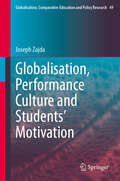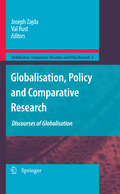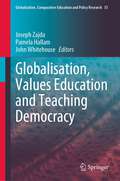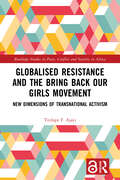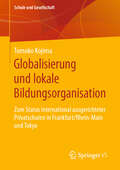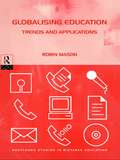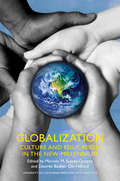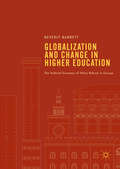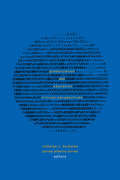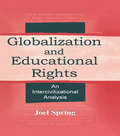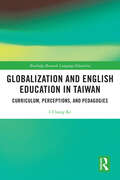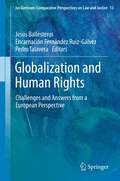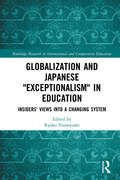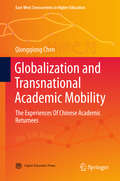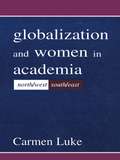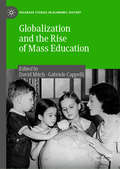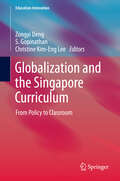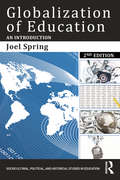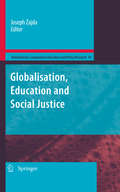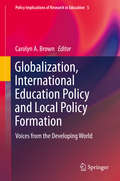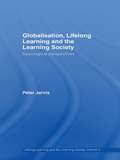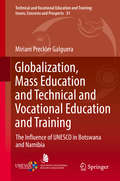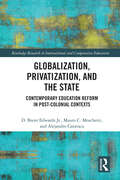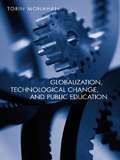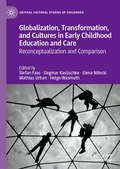- Table View
- List View
Globalisation, Performance Culture and Students’ Motivation (Globalisation, Comparative Education and Policy Research #49)
by Joseph ZajdaThis book analyses education policy trends that affects performing culture, academic excellence and global competitiveness in schools. It focuses on students’ cultural identities and engagement, inclusive schooling, eliminating discrimination and discriminatory practices in the classroom, and relevant values education. One of the major effects of cultural and economic forces of globalisation is that schools and school leaders, like other educational organisations, having modelled their goals and strategies on the entrepreneurial business model. They are compelled to embrace the corporate ethos of efficiency, accountability, performance, and profit-driven managerialism. This corporate ethos reflects a dominant neo-liberal ideology, which exerts a powerful influence on major discourses of democracy, equality, social justice, and education, both locally and globally. By examining the education policy shifts in the use of major discourses concerning performing culture and education, this book offers a comprehensive synthesis of the intersecting and diverse discourses of globalisation, cultural diversity, performing culture, and education. It provides innovative ideas concerning the future directions for authentic models of globalisation, performance culture and students’ motivation.
Globalisation, Policy and Comparative Research
by Joseph Zajda Val RustThis book critically examines the overall interplay between comparative education discourses, globalisation, and education. It draws upon recent studies in relevant areas and explores conceptual frameworks and methodological approaches. It demonstrates the neo-liberal ideological imperatives of education and policy reforms, and illustrates the way the relationship between the State and education policy affects current models and trends in education reforms and schooling globally. Various chapters critique the dominant debates and the newly constructed and re-invented models of neo-liberal ideology in education. Using a number of diverse paradigms in comparative education research, ranging from critical theory to globalisation, the authors, by focusing on globalisation, ideology and democracy, examine both the reasons and outcomes of education reforms, policy change and transformation and provide a more informed critique on the Western-driven models of accountability, quality and school effectiveness.
Globalisation, Values Education and Teaching Democracy (Globalisation, Comparative Education and Policy Research #35)
by Joseph Zajda Pamela Hallam John WhitehouseThis book critiques dominant discourses and debates pertaining to values education, cultural identity and teaching democracy, set against the backdrop of growing social stratification and unequal access to quality education. It addresses discourses concerning globalisation, ideologies and the state, as well as approaches to values education and teaching democracy in schools. The book explores the ambivalent and problematic connections between the state, globalisation, values education and teaching democracy. It also explores conceptual frameworks and methodological approaches applicable to research on values education, multiculturalism and identity politics. Drawing on diverse paradigms, ranging from critical theory to globalisation, and by focusing on globalisation, ideology and values education, the book critically examines research dealing with cultural diversity and its impact of identity politics. Given the need for a multiple perspective approach, the authors have diverse backgrounds and hail from different countries and regions, offer a wealth of insights, contributing to a more holistic understanding of the nexus between values education, multiculturalism and national identity. With contributions from key scholars worldwide, the book should be required reading for a broad spectrum of users, including policy-makers, academics, graduate students, education policy researchers, administrators and practitioners.
Globalised Resistance and the Bring Back Our Girls Movement: New Dimensions of Transnational Activism (Routledge Studies in Peace, Conflict and Security in Africa)
by Titilope F. AjayiThis book uncovers how women’s movements in the Global South are changing the face of transnational activism in their mobilisations against militarism and conflict-related gender violence.Drawing on the case study of the Bring Back Our Girls (BBOG) movement established by Nigerian women for the rescue of Nigerian schoolgirls abducted in 2014 by violent extremist group Boko Haram, the book argues that BBOG is one of several emerging forms of transnational resistance in Africa that are breaking old moulds and forging new directions for social movements globally. The book argues that current research on social movements focuses too much on professional advocacy by formal civil society organisations and networks in the Global North. In doing so, it misses the increasingly spontaneous, mass-based protests initiated and led by Global South actors grounded in Global South contexts. Unpacking the workings of the BBOG movement, both internationally and regarding on-the-ground daily struggles in Nigeria, the book highlights their considerable implications for the practice and study of international politics.This book is an important read for researchers of international relations, decolonisation, social movements, and transnational human rights activism. Activists and leaders of social movements will also find the policy implications highlighted by the book useful.
Globalisierung und lokale Bildungsorganisation: Zum Status international ausgerichteter Privatschulen in Frankfurt/Rhein-Main und Tokyo (Schule und Gesellschaft #71)
by Tomoko KojimaDie qualitative Vergleichsstudie beschäftigt sich mit der Frage, wie sich die lokale Bildungsorganisation gegenwärtig hinsichtlich der Globalisierung und der Präsenz der Privatschulen mit internationalem Profil verändert. Betrachtet werden exemplarische Fälle in zwei global cities, Frankfurt/Rhein-Main und Tokyo. Dabei werden unterschiedliche Formen international ausgerichteter Privatschulen sowie ihre Differenzierung von bzw. Identifikation mit dem lokalen Bildungskontext aufgezeigt. Die damit einhergehende Überschreitung von Grenzen im nationalstaatlichen Erziehungssystem und deren Folgen werden semantisch aus der Governance-Perspektive sowie aus systemtheoretischer Sicht regional kontrastierend diskutiert.
Globalising Education: Trends and Applications (Routledge Studies In Distance Education)
by Robin MasonThis highly topical book charts how the tools of technology are altering the ways in which education is being delivered and received. It looks at the huge impact of the World Wide Web on current educational practice and what this means for the students and teachers involved. It also covers the other new technologies that support the delivery of what is now truly global education.Divided into three clear sections, Globalising Education adopts a systematic and thoroughly researched approach to this exciting topic. The three sections examine:* how global education is actually delivered in practice* case studies which investigate current developments and applications in the USA, Europe, the UK and Australia* conclusions drawn from the general issues covered, as well as an overview of what is happening now and what we might expect to happen in the future.This book looks at current developments in detail. It is essential reading for all those involved in education - whether as a teacher, student or interested onlooker.
Globalization
by Marcelo Suarez-Orozco Desiree B. Qin-HilliardGlobalization defines our era. While it has created a great deal of debate in economic, policy, and grassroots circles, many aspects of the phenomenon remain virtual terra incognita. Education is at the heart of this continent of the unknown. This pathbreaking book examines how globalization and large-scale immigration are affecting children and youth, both in and out of schools. Taking into consideration broad historical, cultural, technological, and demographic changes, the contributors--all leading social scientists in their fields--suggest that these global transformations will require youth to develop new skills, sensibilities, and habits of mind that are far ahead of what most educational systems can now deliver. Drawing from comparative and interdisciplinary materials, the authors examine the complex psychological, sociocultural, and historical implications of globalization for children and youth growing up today. The book explores why new and broader global visions are needed to educate children and youth to be informed, engaged, and critical citizens in the new millennium. Published in association with the Ross Institute
Globalization and Change in Higher Education
by Beverly BarrettThis book sets out political economy explanations for higher education policy reform in Europe in the initial decades of the 21st century. With a sustained focus on the national level of policy implementation, institutional change is considered in relationship to broader trends in economic development and globalization. Since the concept of a "Europe of Knowledge" was presented by the European Commission in 1997, the pursuit of global competitiveness sets the context for the international initiative of the Bologna Process that has created the European Higher Education Area (EHEA). Growing from 29 to 48 participating countries, there are three core explanations for change in the policy process: globalization (economic), intergovernmentalism (political), and Europeanization (social). As part of multi-method research analysis, this book presents qualitative case studies on Portugal and Spain to consider points of comparison, including national governance history and modernization of higher education institutions. The structure of government in these countries affects the policy reforms. Ultimately, the Bologna Process serves as a model for integration of higher education reform in other world regions. This book is essential reading for students, researchers, and policy makers in the fields of education, economics, and public policy.
Globalization and Education: Critical Perspectives (Social Theory, Education And Cultural Change Ser.)
by Carlos Alberto Torres Nicholas C. BurbulesFirst Published in 2000. Routledge is an imprint of Taylor & Francis, an informa company.
Globalization and Educational Rights: An Intercivilizational Analysis (Sociocultural, Political, and Historical Studies in Education)
by Joel SpringThis is the first book to explore the meaning of equality and freedom of education in a global context and their relationship to the universal right to education. It also proposes evaluating school systems according to their achievement of equality and freedom. Education in the 21st century is widely viewed as a necessary condition for the promotion of human welfare, and thus identified as a basic human right. Educational rights are included in many national constitutions written since the global spread of human rights ideas after World War II. But as a global idea, the meaning of educational rights varies between civilizations. In this book, which builds on the concept of the universal right to education set forth in Spring's The Universal Right to Education: Justification, Definition, and Guidelines, his intercivilizational analysis of educational rights focuses on four of the world's major civilizations: Confucian, Islamic, Western, and Hindu. Spring begins by considering educational rights as part of the global flow of ideas and the global culture of schooling. He also considers the tension this generates within different civilizational traditions. Next, he proceeds to: *examine the meaning of educational rights in the Confucian tradition, in the recent history of China, and in the Chinese Constitution; *look at educational rights in the context of Islamic civilization and as presented in the constitutions of Islamic countries, including an analysis of the sharp contrast between the religious orientation of Islamic educational rights and those of China and the West; *explore the problems created by the Western natural rights tradition and the eventual acceptance of educational rights as represented in European constitutions, with a focus on the development and prominence given in the West to the relationship between schooling and equality of opportunity; and, *investigate the effect of global culture on India and the blend of Western and Hindu ideas in the Indian constitution, highlighting the obstacles to fulfillment of educational rights created by centuries of discrimination against women and lower castes. In his conclusion, Spring presents an educational rights statement based on his intercivilizational analysis and his examination of national constitutions. This statement is intended to serve as a model for the inclusion of educational rights in national constitutions.
Globalization and English Education in Taiwan: Curriculum, Perceptions, and Pedagogies (Routledge Research in Language Education)
by I-Chung KeKe’s book examines and reflects on English education in Taiwan from a global English perspective, starting with a discussion on globalization and global Englishes. English education in Taiwan has gone through various major transformations since the intensification of globalization after the 1990s. On one hand, children start to learn English ever earlier while on the other hand, the curriculum and materials in the vocational schools and at the tertiary level become diversified to meet various specific needs of English use. Internationalization of education has brought increasing numbers of international students, and the roles of English in Taiwan are changing constantly with the dynamic environment, from a foreign language to a lingua franca, medium of instruction, and an international language. In his book, the author documents the historical development of education and the roles of English in Taiwan before reviewing curriculum reforms and changes in the past half century. He then presents teachers' and students’ perceptions on global Englishes. He proposes global Englishes pedagogies and his views on what changes can be made to textbooks, learning materials, entrance exams, translation, and the linguistic environment. Practical suggestions to English education in Taiwan in the globalizing context serve as tentative conclusion for the book. Offering insights into English education and its relationship with globalization, Ke’s book will be useful to researchers and students in the fields of global Englishes and English education as well as offering practical pedagogical suggestions for English educators around the world.
Globalization and Human Rights
by Jesús Ballesteros Encarnación Fernández Ruiz-Gálvez Pedro TalaveraGlobalisation turns out to be untenable because it does not guarantee minimum social equity, peace and respect for the environment, and therefore does not guarantee the effective accomplishment of human rights. This book analyzes this issue and raises proposals for a new perspective. The first part describes the soft threats to human rights, derived from the devaluation of the politics and the productive economy with regard to the finance. It entails the concealment of the reality in the shape of exploitation as the tax havens and in the shape of marginalization of the persons with different abilities. The second part include a study of hard threats to human rights and examines two cases of failed states: Afghanistan and Somalia, in which the violence has supplanted the politics and the economy. In view of these situations it is necessary to rethink the force of classic ius gentium and the humanitarian right. The third part presents the European Union as a legal and political space in which conditions of a worthy life are better defended by means of the Primacy of Practical Reason and Social State of Law, and by the requirement of peace as the main rule of international relations.
Globalization and Japanese Exceptionalism in Education: Insiders' Views into a Changing System (Routledge Research in International and Comparative Education)
by Ryoko TsuneyoshiGlobalization is the most common overriding characteristic of our time, with societies all over the world struggling to change their educational systems to meet what are perceived to be the needs of globalization. This book provides an insider's account of how the Japanese educational system is trying to meet that challenge while placing the developments in a larger international context. Distinguishing itself from other books in the same genre, this volume (1) brings in the diversity of insiders‘ reactions concerning globalization reform in education, while placing such actions in the larger international context, and (2) covers a wide span of education (elementary to higher education) and shows how the globalization reforms as a whole are affecting Japanese education. With a focus on insiders’ accounts, this book brings in information that is little known outside of Japan. It also links globalization processes in Japanese society, school education and higher education, accounting for similarities and differences across educational levels, providing insight into the multifaceted processes affecting the Japanese education system. Chapters include: From High School Abroad to College in Japan: The Difficulties of the Japanese Returnee Experience The University of Tokyo PEAK Program: Venues into the Challenges Faced by Japanese Universities Why Does Cultural Diversity Matter? Korean Higher Education in Comparative Perspective
Globalization and Transnational Academic Mobility
by Qiongqiong ChenThis book examines the way Chinese academics returning from the US re-establish their academic identities and professional practices at China's research universities in the context of higher education internationalization in China. It goes beyond economic accounts of academic mobility based on the notions of brain drain, brain gain, and brain circulation. Instead, it uses a cultural approach to explore the everyday experiences of the returning scholars concerning the issues of their sense of identity, as well as their ways of connecting and bringing about changes in their work communities. It will appeal anyone interested in 1) globalization and academic mobility; 2) China's talent policies and strategies; and 3) the internationalization of Chinese universities.
Globalization and Women in Academia: North/west-south/east (Sociocultural, Political, and Historical Studies in Education)
by Carmen LukeIn this cross-cultural exploration of the comparative experiences of Asian and Western women in higher education management, leading feminist theorist Carmen Luke constructs a provocative framework that situates her own standpoint and experiences alongside those of Asian women she studied over a three-year period. She conveys some of the complexity of global sweeps and trends in education and feminist discourse as they intersect with local cultural variations but also dovetail into patterns of regional similarities. Western feminist research has established that relatively few women hold senior positions in universities and colleges. Using the now common metaphor of the "glass ceiling," this research has developed a range of social, cultural, and institutional explanations for women's underrepresentation in academic life. International studies show that women in non-Western countries are also underrepresented in higher education. Yet do Western explanations and strategies for change hold for academic women working in non-Western universities? The very diversity among women's experiences calls into question many of the analytic tools, terms, claims, and solutions formulated by Western feminism. This is the first study to show how cultural differences figure into the institutional dynamics of "glass ceilings." It raises important theoretical and practical, strategic, and tactical questions about issues of cultural difference and institutional power.
Globalization and the Rise of Mass Education (Palgrave Studies in Economic History)
by David Mitch Gabriele CappelliThis edited collection explores the historical determinants of the rise of mass schooling and human capital accumulation based on a global, long-run perspective, focusing on a variety of countries in Europe, the Middle East, Asia, Africa and the Americas. The authors analyze the increasing importance attached to globalization as a factor in how social, institutional and economic change shapes national and regional educational trends. Although recent research in economic history has increasingly devoted more attention to global forces in shaping the institutions and fortunes of different world regions, the link and contrast between national education policies and the forces of globalization remains largely under-researched within the field. The globalization of the world economy, starting in the nineteenth century, brought about important changes that affected school policy itself, as well as the process of long-term human capital accumulation. Large migrations prompted brain drain and gain across countries, alongside rapid transformations in the sectoral composition of the economy and demand for skills. Ideas on education and schooling circulated more easily, bringing about relevant changes in public policy, while the changing political voice of winners and losers from globalization determined the path followed by public choice. Similarly, religion and the spread of missions came to play a crucial role for the rise of schooling globally.
Globalization and the Singapore Curriculum
by Zongyi Deng S Gopinathan Christine Kim-Eng LeeThis volume provides a multi-faceted and critical analysis of the Singapore curriculum in relation to globalization. First, it details reform initiatives established by the Singapore government to meet the challenges posed by globalization. Next, Globalization and the Singapore Curriculum presents how these reforms have been translated into programs, school subjects and operational frameworks and then examines, in turn, how well these have been implemented in schools and classrooms across the country. Through this examination, the book reveals how the initiatives, together with their curricular translation and classroom enactment, reflect on the one hand global features and tendencies and, on the other, distinct national traditions, concerns and practices. It brings to light a set of issues, problems and challenges that not only concern policymakers, educators and reformers in Singapore but also those in other countries as well. Written by curriculum scholars, policy analysts, researchers and teacher educators, Globalization and the Singapore Curriculum offers an up-to-date reference for postgraduate students, scholars and researchers in the areas of curriculum and instruction, comparative education, educational sociology, educational policy and leadership in Singapore, the Asia Pacific region and beyond. It also offers a vital contribution to the story of modern education around the globe: providing international students, scholars and researchers valuable insights into curriculum and curriculum reform for the 21st century.
Globalization of Education: An Introduction (Sociocultural, Political, and Historical Studies in Education)
by Joel SpringContinuing Joel Spring’s reportage and analysis of the intersection of global forces and education, this text offers a comprehensive overview and synthesis of current research, theories, and models related to the topic. Written in his signature clear, narrative style, Spring introduces the processes, institutions, and forces by which schooling has been globalized and examines the impact of these forces on schooling in local contexts. Significant conceptual frameworks are added to this Second Edition, specifically the “economization of education,” “corporatization of education” and the “audit state.” These concepts are embedded in the global educational plans of major organizations such as the World Bank, the Organization for Economic Development and Cooperation (OECD), World Economic Forum, and multinational corporations. Globalization of Education, Second Edition features new and updated information on • The World Bank• OECD and the United Nations• The World Trade Organization and the Global Culture of Higher Education• Corporatization of Global Education• Religious and Indigenous Education Models• The Global Workforce: Migration and the Talent Auction• Globalization and Complex Thought
Globalization, Education and Social Justice
by Joseph ZajdaGlobalization, Education and Social Justice, which is the tenth volume in the 12-volume book series Globalisation, Comparative Education and Policy Research, presents up-to-date scholarly research on major discourses concerning global trends in education, social justice and policy research. It provides an easily accessible, practical yet scholarly source of information about the international concern in the field of social justice, globalisation, and policy research. Above all, the book offers the latest findings to the critical issues in education and social justice globally. It is a sourcebook of ideas for researchers, practitioners and policy makers in education, globalisation and social justice education reforms around the world. It offers a timely overview of current issues in social justice affecting education policy research in the global culture. It provides directions in education, and policy research, relevant to transformational educational reforms in the 21st century. The book critically examines the overall interplay between globalisation, education reforms, and social justice. It draws upon recent studies in the areas of globalisation, social justice education reforms and the role of the State. It explores conceptual frameworks and methodological approaches applicable in the research covering the State, globalisation, equity, education, and social justice. It demonstrates the neo-liberal ideological imperatives of education and policy reforms, and illustrates the way the relationship between the State and education policy affects current models and trends in education reforms for social justice and schooling globally. Various book chapters critique the dominant discourses and debates pertaining to the politics of social justice and education globally and the newly constructed and re-invented models of neo-liberal ideology in education and policy reforms. Using a number of diverse paradigms in comparative education research, ranging from critical theory to post-structuralist discourses, the authors, by focusing on globalisation, social justice and democracy, attempt to examine critically both the reasons and outcomes of education reforms and policy change for social justice. The volume offers a more informed critique on the Western-driven models of education reforms and implications for social justice. The book also draws upon recent studies in the areas of equity, cultural capital and dominant ideologies in education. The general intention is to make Globalization, Education and Social Justice available to a broad spectrum of users among policy-makers, academics, graduate students, education policy researchers, administrators, and practitioners in the education and related professions.
Globalization, International Education Policy and Local Policy Formation
by Carolyn A. BrownThis edited volume focuses on how international education policy, set by international policymakers and donors, influences local education policy in developing countries. The book's primary purpose is to give voice to scholars from developing countries and regions around the world by inviting them to explore how the international policy, invariably linked to international aid, influences education policy formation and implementation in their country or region and how this influence does or does not meet the local cultural, social, economic, and political needs. A relatively recent and small body of research and commentary supports a discourse that questions how well international education policy mandates such as Education For All serve the needs of developing countries. The intent of this book is to advance this discourse by giving voice to local scholars who observe and study the donor process. The book will be divided into two sections: the first section will set the stage for the discussions in the second section by providing theoretical and historical context for international education policy. As a framework for understanding, the book adopts the position that international policy does not have either the ability or the intent to serve the widely diverse needs of development around the world. International education policy has been formed, historically, by wealthy nations and agencies dominated by Western theoretical paradigms. In recent years, donor countries have made an effort to collaborate with developing countries in developing international education policy goals; however, this collaboration has been limited. Following establishment of the context of international education policy, section II of the book provides a forum for scholars from around the world to openly discuss and critique the impact of international policy on education in their country or region.
Globalization, Lifelong Learning and the Learning Society: Sociological Perspectives (Lifelong Learning and the Learning Society)
by Peter JarvisThis book critically assesses the learning that is required and provided within a learning society and gives a detailed sociological analysis of the emerging role of lifelong learning with examples from around the globe. Divided into three clear parts the book: looks at the development of the knowledge economy provides a critique of lifelong learning and the learning society focuses on the changing nature of research in the learning society. The author, well-known and highly respected in this field, examines how lifelong learning and the learning society have become social phenomena across the globe. He argues that the driving forces of globalisation are radically changing lifelong learning and shows that adult education/learning only gained mainstream status because of these global changes and as learning became more work orientated.
Globalization, Mass Education and Technical and Vocational Education and Training: The Influence of UNESCO in Botswana and Namibia (Technical and Vocational Education and Training: Issues, Concerns and Prospects #31)
by Miriam Preckler GalgueraThis book assesses the influence of the international organization UNESCO on the development of national Technical and Vocational Education and Training (TVET) systems in the Southern African Community Region (SADC), focusing particularly on Botswana and Namibia. Designed around UNESCO’s Better Education for Africa’s Rise (BEAR) project, the study is an excellent example of applied policy research.Analysis is from the perspective of key stakeholders including UNESCO headquarters and field offices, Ministries of Education and of Labor, employers and employees, education and training institutions, international partners and more. Both qualitative and quantitative evidence are used to provide a comparative overview, and the author also reveals the current state of data on skills.Readers will discover common goals and challenges across the nations but also a common lack of action to measure the impact and influence that UNESCO’s programs have had at a national level, prior to this study. Were the newly implemented educational policies successful or not? If the public policies failed, why was that? These chapters shed light on such questions and how UNESCO's contribution influenced the national development processes, in the context of globalization processes and trends of global mass education.The book has much to offer for both scholars and those working in UN agencies or national governments who seek to develop education systems and better link them to the world of work.
Globalization, Privatization, and the State: Contemporary Education Reform in Post-Colonial Contexts (Routledge Research in International and Comparative Education)
by D. Brent Edwards Jr. Mauro C. Moschetti Alejandro CaravacaThis text explores how the dynamics of globalization and privatization have influenced state policy and impacted education reform in Honduras. Chapters document historical trends and the evolution of Honduras as a post-colonial nation, before looking in detail at recent state interventions in policy at pre-school, elementary, and secondary level. By offering empirical analysis of the Honduran education sector, the changing role and priorities of the state, and the increasing involvement of international organizations, NGOs, and private actors in the provision of education, the text increases understanding of how state theory interacts with broader global dynamics to impact education. This text will benefit researchers, academics, and educators with a focus on international and comparative education, policy analysis, globalization, and international development.
Globalization, Technological Change, and Public Education
by Torin MonahanGlobalization, Technological Change, and Public Education documents the dramatic changes taking place in public education through the incorporation of new information technologies. These additions to the public school environment have generally been seen as enabling tools to help students and nations compete in the global marketplace. Yet a closer look at the interplay of technological change and organizational restructuring suggests the emergence of new, less promising power relations. Through detailed ethnographic research and interviews in the Los Angeles public school system, Torin Monahan reveals how, with few exceptions, these changes to the educational process are forcing both students and workers to adapt to systems that are ever more rigid and controlling.
Globalization, Transformation, and Cultures in Early Childhood Education and Care: Reconceptualization and Comparison (Critical Cultural Studies of Childhood)
by Mathias Urban Stefan Faas Dagmar Kasüschke Elena Nitecki Helge WasmuthThis edited volume provides a critical discussion of globalization and transformation, considering the cultural contexts of early childhood education systems as discourses as well as concrete phenomena and ‘lived experience.’ The book focuses on theoretical explorations and critical discourses at the level of education policy (macro), the level of institutions (meso), and the level of social interactions (micro). The chapters offer a wide range of interpretative, contextualized perspectives on early childhood education as a cultural construct.
